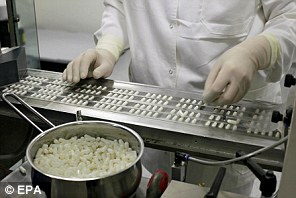Pictured for the first time since drug cheat scandal: Maria Sharapova puts on a brave face as she hits the gym and shops still in Nike gear and driving her Porsche - despite BOTH brands dumping her
- Nike suspended Sharapova's $8.5million-a-year contract hours after she revealed she had failed a drug test
- Porsche and TAG Heuer, who each had $2.8million deals with her, said they wouldn't seek further contracts in the future
- Sharapova tested positive for meldonium, a newly prohibited medicine, after competing in Australian Open
- Received letter on December 22 from WADA informing her of changes and admitted she didn't look at the list
- The 28-year-old said she had taken meldonium for ten years due to 'health issues', including a family history of diabetes
- See more of the latest news on Maria Sharapova and her doping charge
Maria Sharapova was spotted head to toe in Nike gear and drove her Porsche to the supermarket - even though both brands suspended their relationship with her after she revealed she had failed a drug test.
The five-time Grand Slam champion hit the gym in Los Angeles wearing black Nike leggings and a black Nike sweatshirt. The brand ended her most lucrative deal, an eight-year contract extended in 2010 for a reported $8.5 millions a year, just hours after her announcement on Monday.
Sharapova, 28, looked relaxed and even smiled as she walked around, even though she has lost at least $14 millions worth of sponsorship contracts in the past 24 hours and doesn't know yet how her career will be affected.
She then drove her Porsche to Whole Foods, this time wearing white Nike sneakers. Porsche, another one of her major partners, said that while they are 'certainly not dumping' Sharapova, they are currently 'not pursuing any further activities' with her. Her deal with Porsche was worth $2.8 million.
Swiss watch brand TAG Heuer followed suit, saying its contract with Sharapova had expired at the end of 2015 and it has pulled out of negotiations on a new agreement. The contract was also priced at $2.8 million.
Scroll down for video

Maria Sharapova was spotted hitting the gym in Los Angeles, just a day after admitting she had failed a drug test and would be suspended as a result


The five-time Grand Slam champion wore Nike leggings and a Nike sweatshirt even though the brand ended their deal, an eight-year contract extended in 2010 for a reported $70 million, just hours after her announcement. T

Sharapova, 28, was also spotted driving her Porsche to the supermarket on Tuesday afternoon. Porsche, said that while they are 'certainly not dumping' Sharapova, they are currently 'not pursuing any further activities' with her
Her other partners, Avon, Evian and Head, have yet to comment.
She admitted yesterday during a press conference at a Los Angeles hotel she had tested positive for meldonium, a drug she had been taking for a decade, during the Australian Open in January.
The International Tennis Federation has confirmed Sharapova will be provisionally suspended from the sport from March 12 but hasn't said how long her suspension will last.
Serena Williams praised Sharapova for her 'courage' in disclosing her failed drug test, saying she had shown 'a lot of courage'.

Nike's deal with Sharapova was worth $8.5million a year. Her contracts with TAG Heuer and Porsche reached $2.8 million each. This brings her losses to at least $14milion - and her other partners Avon, Evian and Head have yet to comment

The day after admitting she had tested positive for meldonium, Sharapova shopped at Whole Foods and kept her sunglasses inside. She said during a press conference she took 'full responsibility' for failing the test

Sharapova, pictured during her trip to Whole Foods on Tuesday, said she received an email telling her meldonium had been added to the list of banned substances but didn't look at it

The Russian athlete said she was first given meldonium in 2006 by her 'family doctor' due to health issues such as a magnesium deficiency and a genetic disposition towards diabetes
'I think most people were happy she was upfront and very honest,' Williams said during a news conference for a Madison Square Garden event on Tuesday.
'It's just taking responsibility, which she admitted that she was willing and ready to do,' Williams added. 'Just hope for the best for everybody in that situation.'
'I think she's always shown courage and heart in everything she's done, and this is no different.'
Despite Sharapova's suspension, the president of the Russian Tennis Federation has said he expects her to play in the Olympics in Brazil in August this year.
Meldonium, the drug that caused her to fail the test, also known as Mildronate, was legal for most of Sharapova's career but was banned on January 1.
The Russian athlete said she received an email from WADA informing her of the changes but didn't look at the list.
She said during her news conference that she was initially given meldonium in 2006 by her 'family doctor' and kept taking it for a decade due to health issues such as a magnesium deficiency and a genetic disposition towards diabetes.
However, the drug which is mainly available in Eastern Europe is said to have become a drug of choice for Russian athletes implicated of cheating in other sports. It was regularly given to Soviet troops in the 1980s to boost their stamina.
Latvian manufacturers that make meldonium have now said that the substance is normally prescribed for medical use for four to six weeks - much shorter than Sharapova's course of treatment.
A Grindeks spokesman said: ‘Depending on the patient's health condition, treatment course of meldonium preparations may vary from four to six weeks.
‘Treatment course can be repeated twice or thrice a year.
‘Only physicians can follow and evaluate patient's health condition and state whether the patient should use meldonium for a longer period of time.’

Sharapova looked relaxed even though she has lost millions of dollars worth of sponsorship deals in the past 24 hours and doesn't know yet how her career will be affected

The International Tennis Federation has confirmed Sharapova will be provisionally suspended from the sport from March 12 but hasn't said how long her suspension will last

Announcement: Maria Sharapova revealed that she failed a drugs test at the 2016 Australian Open after testing positive for meldonium


Revelation: The 28-year-old Russian tennis player confirmed the shock news at a pre-arranged press conference held in Los Angeles

Admission: Reading a statement to a host of journalists in Los Angeles yesterday, she said she took 'full responsibility' for the test failure
In a statement on Monday night, Nike said: 'We are saddened and surprised by the news about Maria Sharapova. We have decided to suspend our relationship with Maria while the investigation continues. We will continue to monitor the situation.'
Sharapova earns $30million (£20million) a year in endorsements, according to Forbes. Current endorsements include American Express, Avon, Evian, Porsche.
‘We have enjoyed a very good relationship with Maria Sharapova during our partnership,’ Viktoria Wohlrapp, head of sports communications at Porsche, told MailOnline.
‘We are saddened by the recent news announced by her, and until further details are released and we can analyse the situation, we have chosen to postpone planned activities.
‘This could go either way, but we are certainly not dumping her.
An Evian spokesman said today that the company was 'surprised' by the announcement, but would neither confirm not deny that they were ending their endorsement deal with Sharapova.
'Evian has been a partner of Maria Sharapova for many years, and until now, we have maintained a trustworthy professional relationship,' a spokesman told MailOnline.
'Evian attaches great importance to health, to integrity and to transparency, and we will follow closely the development of the investigation.'
Avon said on Tuesday morning that they are not commenting on their contract with Sharapova, who is the face of their fragrance called Luck.
Many assumed Sharapova would announce her retirement during Monday's press conference, following a spate of injuries.
Instead, she revealed the catastrophic news for her career.
'I had legally been taking this for ten years,' she said.
'I take responsibility for my professionalism in my job and I made a big mistake. I know there will be consequences and I don't want to end my career this way. I really hope I will be given another chance to play tennis again. I can't blame anyone but myself. I have let my fans down.
'I know many of you thought I was retiring but if I was ever going to announce my retirement it would probably not be in a downtown Lost Angeles hotel with this fairly ugly carpet.'
'It made me healthy and that is why I continued to take it,' Sharapova said of the banned substance after taking a small number of questions from the floor.
'I am still working through my injury and that is the reason I withdrew from Palm Springs, because I have still not healed my injury.
Asked if she knew what the consequences of her failed test may be, Sharapova added: 'I do not. This is very new for me, I just received the letter a few days ago and I will be working with the ITF.'
The full statement from the ITF made clear Sharapova accepted the charge against her.
It said: 'Following the statement made by Maria Sharapova in a press conference today, the Tennis Anti-Doping Programme (TADP) can confirm the following:
'On 26 January 2016, Ms Sharapova provided an anti-doping sample to the TADP in association with her participation in the 2016 Australian Open.
'That sample was analysed by a World Anti-Doping Agency (WADA) accredited laboratory, which returned a positive for meldonium, which is a prohibited substance under the WADA Code and, therefore also the TADP.
'In accordance with Article 8.1.1 of the TADP, Ms Sharapova was charged on 2 March with an Anti-Doping Rule Violation.
'Ms Sharapova has accepted the finding of meldonium in her sample collected on 26 January.
'As meldonium is a non-specified substance under the WADA (and, therefore, TADP) list of Prohibited Substances and Prohibited Methods, Ms Sharapova will be provisionally suspended with effect from 12 March, pending determination of the case.'

Sharapova poses with her trophy after she won against Serena Williams in the ladies' final match at Wimbledon in 2004. Serena has since praised Sharapova's 'courage' in disclosing her failed drug test
In response to the announcement, Steve Simon, WTA chief executive, said: 'I am very saddened to hear this news about Maria. Maria is a leader and I have always known her to be a woman of great integrity.
'Nevertheless, as Maria acknowledged, it is every player's responsibility to know what they put in their body and to know if it is permissible.
'This matter is now in the hands of the Tennis Anti-Doping Program and its standard procedures. The WTA will support the decisions reached through this process.'
The 28-year-old faces a ban of several years, having been informed of the finding 'a few days ago'. She said that was unrelated to her withdrawal from the Indian Wells event this week, as she is presently injured anyway.
'It is very important for you to understand that for ten years this medicine was not on WADA's banned list and I had legally been taking the medicine for the past ten years,' insisted the Russian.
'But on January 1 the rules had changed and meldonium became a prohibited substance which I had not known.'
However, Russian tennis chief Shamil Tarpishchev dismissed the provisional suspension, saying he expects Sharapova to represent her country at this year's Olympics in Brazil.
"I think this is just a load of nonsense,' Mr Tarpishchev, president of the Russian Tennis Federation, said in an interview with the TASS news agency.
'The sportsmen take what they are given by the physiotherapists and by the doctors. I think Sharapova will play at the Olympics, however, we will need to see how this will develop.'
Sharapova said on Monday that this was not how she wanted her career to end and she hoped to find her way back to tennis one day.


She falls to her knees in celebration (left) and poses with trophy after beating Serena Williams in the 2004 Wimbledon final

Sharapova poses with the US Open trophy after defeating Justine Henin-Hardenne in the 2006 final
-
 Loyal penguin travels thousands of miles to meet his rescuer
Loyal penguin travels thousands of miles to meet his rescuer
-
 Sheriff's deputy foils cab robbery in Reading, PA
Sheriff's deputy foils cab robbery in Reading, PA
-
 Child accidentally shoots gun advocate mom
Child accidentally shoots gun advocate mom
-
 Sick 'British' ISIS member says America will be attacked...
Sick 'British' ISIS member says America will be attacked...
-
 Hillary Clinton: I'm not even answering that question
Hillary Clinton: I'm not even answering that question
-
 Heartachingly cute friendship between labrador and tiny...
Heartachingly cute friendship between labrador and tiny...
-
 GRAPHIC: Moment doctor removes cyst from patient named...
GRAPHIC: Moment doctor removes cyst from patient named...
-
 Son surprises dad with a 1966 Thunderbird, his dream car
Son surprises dad with a 1966 Thunderbird, his dream car
-
 Watch moment would-be robber enters elevator with woman
Watch moment would-be robber enters elevator with woman
-
 Dynamo reveals incredible illusion secrets for very first...
Dynamo reveals incredible illusion secrets for very first...
-
 'I don't know how to handle this': Anna Duggar visits Josh
'I don't know how to handle this': Anna Duggar visits Josh
-
 UFO is spotted overhead on a car's dashcam footage
UFO is spotted overhead on a car's dashcam footage
-
 Pro-gun Florida mom is accidentally shot by her...
Pro-gun Florida mom is accidentally shot by her...
-
 'I love the penguin like it's my own child and I believe the...
'I love the penguin like it's my own child and I believe the...
-
 English-speaking ISIS jihadi warns America they will be...
English-speaking ISIS jihadi warns America they will be...
-
 Marcia Clark's nude photos humiliation: How naked pictures...
Marcia Clark's nude photos humiliation: How naked pictures...
-
 Final farewell to a beloved First Lady: Nancy Reagan's body...
Final farewell to a beloved First Lady: Nancy Reagan's body...
-
 The swan that died for a photograph: Tourist kills a bird by...
The swan that died for a photograph: Tourist kills a bird by...
-
 Equestrians around the world share riding photos after...
Equestrians around the world share riding photos after...
-
 'Canada's Obama' arrives in DC: Prime minister Justin...
'Canada's Obama' arrives in DC: Prime minister Justin...
-
 The moment passenger pulled out a gun to rob his taxi...
The moment passenger pulled out a gun to rob his taxi...
-
 Hillary's fury at being asked during Democratic debate if...
Hillary's fury at being asked during Democratic debate if...
-
 President Obama SNUBS Nancy Reagan's funeral so he can speak...
President Obama SNUBS Nancy Reagan's funeral so he can speak...
-
 'I just fixed the internet': Kim Kardashian's racy nude...
'I just fixed the internet': Kim Kardashian's racy nude...



















































































































































































































































































































































